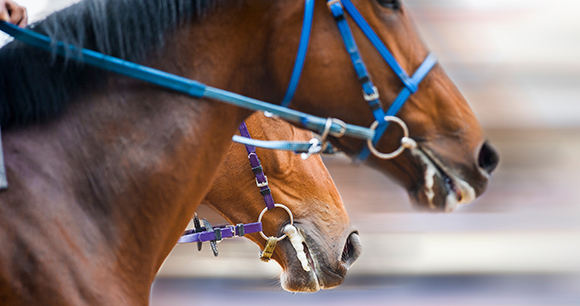
Whether they are thoroughbreds running full tilt around an outdoor track or walking horses stepping gracefully across an arena, horses bred for competition undergo extensive training and conditioning. For owners and trainers, a champion horse can mean big money and a place in the record books. As with any competitive enterprise, however, high stakes can push a will to win over the line into a will to win at any cost. Too often, the single-minded pursuit of victory supersedes the safety and well-being of the horses themselves. Thoroughbreds are given drugs to enhance performance and mask pain. Conversely, walking horses are “sored”—intentionally put in pain to “enhance” their high-stepping gait.
AWI is working to curb rampant abuse in both fields.
Horse Racing
The world of horse racing—both at sanctioned tracks and unsanctioned “bush” tracks—is desperately in need of reform, as horses routinely break down on racetracks across the country, pushed to and beyond their physical limits. AWI was instrumental in securing passage of the Horseracing Integrity and Safety Act (HISA)—historic legislation enacted in 2020 and aimed at cleaning up thoroughbred racing in the United States. Subsequently, AWI has pushed for the robust implementation of “anti-doping and medication control” regulations and racetrack safety rules. We submitted multiple regulatory comments to the Federal Trade Commission, which ultimately approved HISA’s proposed regulations (citing AWI’s comments in the order approving the anti-doping and medication control rule). However, further reforms are still necessary to protect racehorses in the United States, including breeding and training reforms. AWI is staunchly opposed to unsanctioned horse racing at bush tracks, where equine cruelty, criminal activity, and biosecurity threats abound.
Horse Soring
Horse soring involves the intentional infliction of pain on Tennessee walking horses and related breeds to achieve a distinct high-stepping gait that is rewarded in the show ring. Soring methods include applying diesel fuel and kerosene to burn the skin of horses’ legs, grinding down hooves to expose sensitive tissues, and applying sharp or abrasive objects to tender areas. When the Horse Protection Act (HPA) was enacted in 1970, it was intended to shield horses from the barbaric practices associated with soring. For over 50 years, however, soring has persisted because of glaring problems with oversight and enforcement of the law.
A win for equine welfare was achieved in May 2024 when the US Department of Agriculture finalized long-awaited HPA regulations. However, the regulations have faced numerous challenges from the Tennessee walking horse industry. Originally slated to come into effect February 1, 2025, the USDA has postponed the effective date until February 1, 2026 and requested comments related to further postponement. In addition, a federal lawsuit filed by the Tennessee Walking Horse National Celebration Association and two horse show owners succeeded in challenging much of the new rule. Despite the setbacks, the improved regulations will eliminate the ineffectual industry self-policing scheme, replacing it with a program of trained and impartial inspectors with veterinary and animal control experience. As the changes are implemented, AWI will continue to work to curb horse soring and advance meaningful reforms.
We can do more to end this abuse by passing the Prevent All Soring Tactics (PAST) Act. Learn more about this federal bill to protect horses from soring.